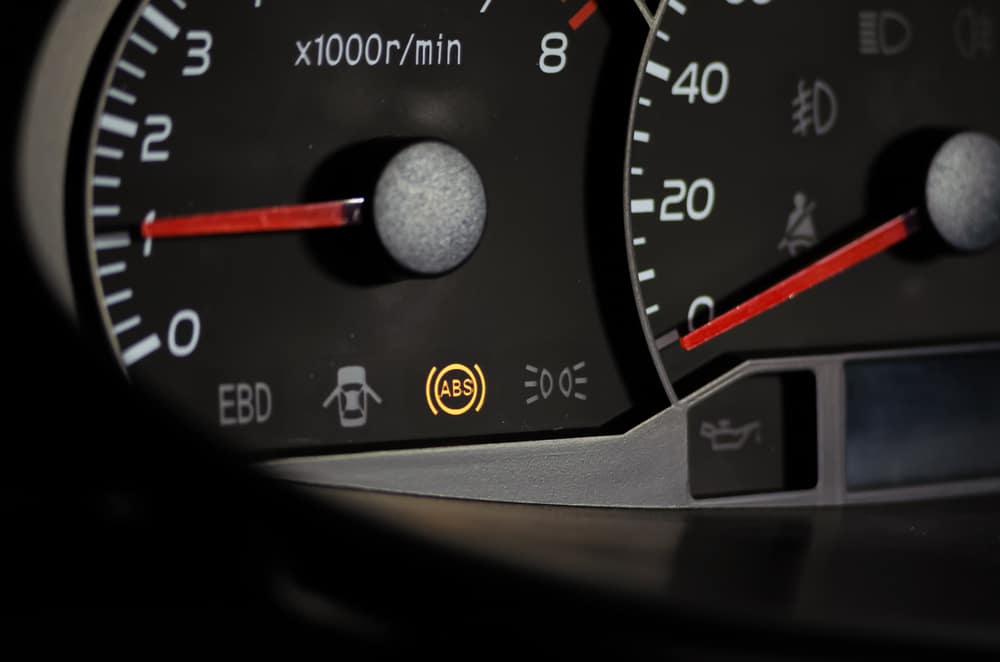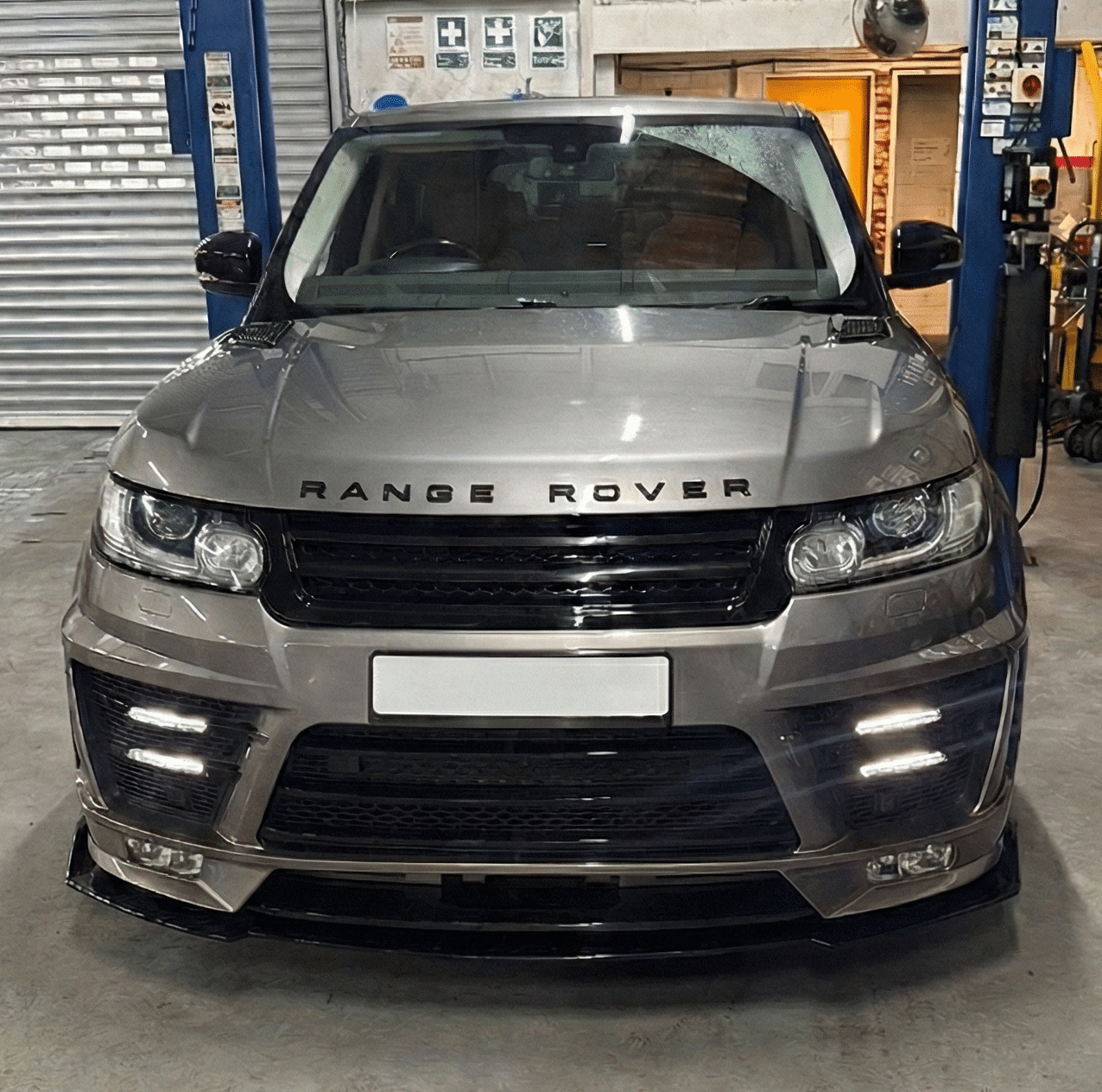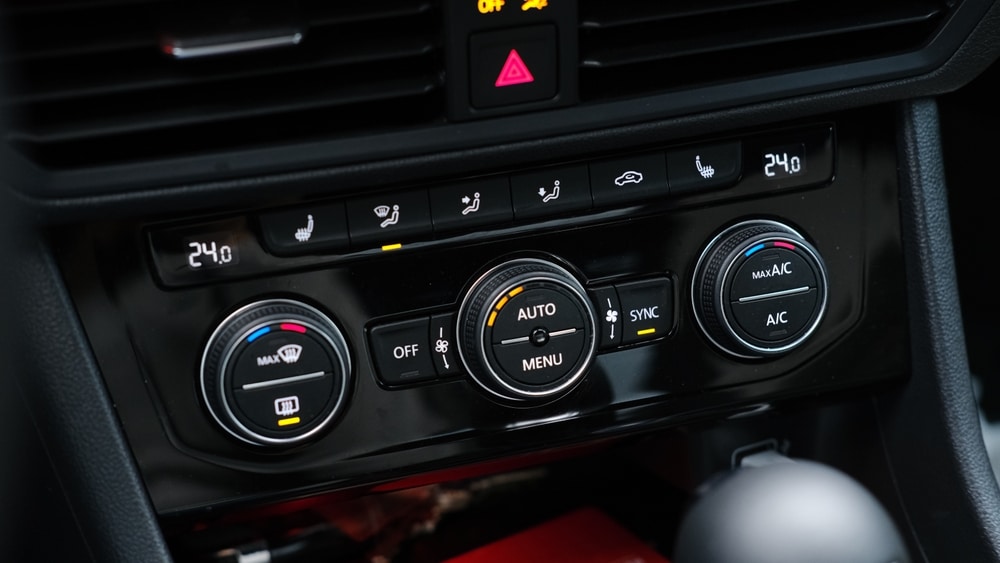Anti-Lock Brakes
You’re driving near Langport when a car ahead of you brakes sharply. You respond instantly, but instead of coming to a stop in control, your wheels lock and the car skids. You lose your steering control, and for a split second, you’re in an uncontrollable road skid. That’s when you remember — the ABS warning light has been on all week.
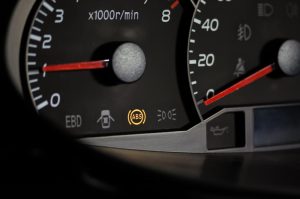
Your anti-lock braking system is designed to prevent that kind of loss of control. It doesn’t just support your stopping power – it helps you steer safely while braking hard. But when the ABS isn’t working, your margin for error disappears.
At Shires Garage in Langport, we regularly investigate issues linked to the ABS light, from faulty wheel sensors to wiring faults and full ABS module failures. If your ABS light is on, sit and hope. It needs urgent attention. ABS is a highly complex system that requires time with our expert technicians.
In this blog, we’ll explain what your anti-lock brakes really do, how the system works behind the scenes, and the warning signs you should never ignore.
Let’s get started.
How Anti-Lock Brakes Keep You in Control
When you slam the brakes in an emergency, it’s not just about stopping – it’s about staying in control while you do. And that’s precisely what your anti-lock braking system (ABS) is there to help with.
Without ABS, hard braking can cause the wheels to lock, especially on slippery or uneven surfaces. When that happens, your tyres lose grip, and your ability to steer disappears. The car keeps moving, but you no longer have control of where it goes.
ABS works by detecting when a wheel is about to lock and then rapidly adjusting the brake pressure at that wheel. This keeps it turning just enough to maintain traction with the road, giving you the best chance to steer around hazards, rather than skidding into them.
It’s a safety feature you might not notice until the moment it matters most. And if your ABS light is on, there’s a risk it won’t be there when you need it.
How Anti-Lock Brakes (ABS) Step In When It Senses Grip Will Be Lost
Under normal driving conditions, your ABS stays quietly in the background, monitoring each wheel’s speed. But when you brake hard, especially in an emergency situation, the system reacts in real time to help you stay in control.
Every wheel has its own ABS sensor that sends speed data to the control unit. If the system detects that one wheel is decelerating much faster than the others, it recognises that it’s about to lock. In response, the ABS module adjusts the brake pressure by rapidly opening and closing valves in the hydraulic circuit. This lets the wheel regain grip before braking resumes.
That entire cycle happens in milliseconds, many times per second, faster than any driver could react. You might feel it as a pulsing sensation through the brake pedal. That’s your ABS working to stop the wheels locking and to keep you steering safely.
If you don’t feel that pulsing under hard braking or your ABS warning light is on, the system may not be functioning. At Shires Garage in Langport, we can pinpoint the fault and restore your braking control before it becomes a safety risk.
The Key Components Behind Your ABS System
Your anti-lock brakes system relies on a network of precision parts to detect wheel speed, manage hydraulic pressure, and respond instantly when braking becomes critical. If one element fails, the whole system can be compromised – and that’s when the ABS warning light comes on.
Here’s what each component does:
- Wheel speed sensors – Positioned at each wheel hub, these sensors track rotation speed in real time. If they send incorrect or no data, the ABS may deactivate altogether.
- ABS control unit (ECU) – Found in the engine bay, this is the brain of the system. It compares input from all four sensors and decides when to activate the ABS.
- Hydraulic modulator and pump – Also under the bonnet, this controls brake pressure to each wheel during ABS operation. If there’s a fault here, the system may not be able to adjust pressure accurately.
- Valves and brake lines – These components form the pathway for fluid control. If any part is blocked or malfunctioning, the system’s response time may be delayed.
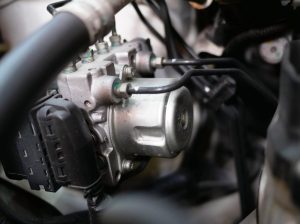
At Shires Garage, we run full system checks to detect anything from a worn ABS sensor to more complex module faults. If your ABS light is on, we’ll identify the cause and restore your braking system to full safety. Call us on 01458 250570 to get in touch.
Still have questions? Read our blogs on Brake Pads, Brake Discs, and Braking Systems for a closer look at how each part contributes to your car’s stopping power.
How ABS Connects to Other Safety Systems in Your Car
Your ABS doesn’t work alone. It’s a core part of your vehicle’s wider safety system – feeding critical data to other features designed to keep you stable and in control. If the ABS isn’t working, these systems can also fail or shut down.
Here’s how they interact:
- Electronic Brakeforce Distribution (EBD) – This adjusts how braking power is shared between front and rear wheels. It uses ABS sensor data to ensure your vehicle stays balanced during sudden stops or heavy loads.
- Traction Control System (TCS) – When a driven wheel slips during acceleration, traction control steps in to restore grip. It relies on wheel speed inputs from the ABS to detect the problem early.
- Electronic Stability Programme (ESP) – If your vehicle starts to oversteer or understeer, ESP applies precise brake force to individual wheels to help you regain control. It also uses the ABS network to detect loss of stability.
If your ABS sensor is failing or the module is faulty, these systems can’t operate correctly – and that puts your braking and handling at risk.
At Shires Garage in Langport, we check the full picture – not just the ABS light, but everything linked to it – to keep you protected on every journey.
The Conditions and Faults That Can Disrupt Anti-Lock Brakes System Performance
Your ABS is designed to respond instantly when braking becomes critical. But like any system, it depends on the right conditions and components to do its job properly. When those are compromised, ABS performance can drop without warning.
The road surface is one major factor. On loose gravel, ice, or worn tarmac, even a working ABS can struggle to maintain traction. The system will still try to keep the wheels rotating, but if the tyres can’t grip the surface, your stopping and steering ability may still be limited.
More often, though, the issue lies with the system itself. A faulty ABS sensor, corroded wiring, or failing modulator can all prevent ABS from engaging when it’s needed. In many cases, the first sign of a problem is the ABS warning light appearing on your dashboard – something never to ignore.
At Shires Garage in Langport, we don’t just clear the light – we trace it back to the source. Whether it’s sensor data loss, low voltage, or a deeper ABS module fault, our technicians will find the fault fast and get your system back on track.
Warning Signs That Your ABS Might Be Failing
When ABS fails, your brakes won’t necessarily stop working, but your control during emergency braking will be compromised. That’s why it’s important to catch the early signs before you need the system to step in.
Here’s what to look for:
The ABS light stays on
This is the most common clue. If the light doesn’t go out after the engine’s usual self-check during startup, the system has logged a fault. It may be something simple like a dirty sensor, or something more serious, but either way, your ABS may not activate if needed.
No pulsing during hard braking
Normally, ABS creates a pulsing sensation through the brake pedal. That’s the system rapidly adjusting brake pressure. If it’s missing, the system likely isn’t functioning.
Brake warning light also appears
If both the ABS light and the brake warning light are showing, there may be a wider problem with your braking control system. This should always be treated as urgent.
At Shires Garage, we run full system tests to find the cause behind the warning, whether it’s a sensor fault, pressure issue, or failing ABS module, and safely restore your braking system to full operation. Don’t leave things to chance, call us on 01458 250570 if you are unsure.
Why You Shouldn’t Ignore ABS or Brake Warnings
It’s tempting to keep driving when everything feels normal, even if a dashboard light is glowing. But if your ABS light or brake warning light is showing, your braking system may no longer be providing the support you expect in an emergency.
Once ABS is disabled, you lose the ability to steer under hard braking. And while your standard brakes might still function, you’re no longer protected against wheel lock, especially on wet or uneven roads.
That light might be caused by a simple sensor fault, a corroded wire, or a more serious ABS module issue – but until it’s checked, the system may not work.
There’s also the MOT impact. An illuminated ABS warning results in an automatic fail. Combined with a brake warning light, that’s two major defects needing immediate attention.
At Shires Garage in Langport, we treat every brake system fault as urgent. If you’re seeing warning lights – or even if braking feels different – we’ll run a full system check and restore your safety net before it’s too late.
Shires Garage in Langport Will Keep Your Brakes Road Ready
Your anti-lock braking system is there to protect you in an emergency – but only if it’s working as it should. If your ABS light or brake warning light is showing, don’t wait until it’s too late.
At Shires Garage, we carry out in-depth brake system checks to uncover faults with your ABS sensors, wiring, or module before they affect your safety. Whether it’s a small sensor issue or a deeper ABS module fault, our technicians will find it and fix it.
Here’s what you can expect when you choose us:
✔ Accurate ABS testing and fault diagnosis
✔ Trusted advice from experienced technicians
✔ 12-month parts and labour guarantee
✔ Free courtesy car while your vehicle is with us
We’re proud to keep drivers in Langport and Taunton safe on the road every day.
Check out our {{average-rating}} star Google rating from {{review-count}} happy customers.
📞 Call us today on 01458 250570 to book your ABS inspection or brake system repair.
